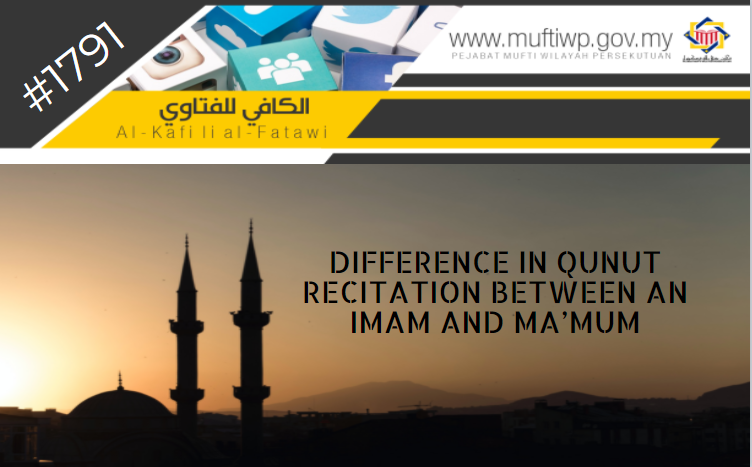Question:
Assalamualaikum. I heard many versions of qunut recitation of imams in congregational Subh prayer. Some lengthening it while some make it short. I would like to ask, is it permissible to add any du’a within it?
Hope for an explanation. Thank you.
Brief Answer:
In conclusion, it is permissible to insert any du’a and praise to Allah SWT in qunut recitation, including verses of al-Quran with both meanings. However, the most prioritised qunut recitation is what is mentioned in the hadith narrated by the Prophet PBUH.
In addition, imam should not lengthen qunut recitation intentionally without having any reason and need because the ruling of lengthening the qunut is makruh. Besides, imam also shall use the plural form in the recitation so that the du’a may include all people in the congregation.
Wallahu a’lam.
Explanation:
Alhamdulillah, praise and thanks to Allah for the countless blessings He has blessed us all with. Blessings and salutations to the Prophet Muhammad PBUH, his wives, his family, companions and all those that follow his teachings to the day of judgement.
Qunut recitation is a specific dhikr containing supplication and praises to Allah SWT. It may be recited with any recitation containing both elements including verses of al-Quran with the condition the person sets the intention of reciting qunut. This is as mentioned in Kasyifah al-Saja Syarh Safinat al-Naja that:
والقنوت هو ذكر مخصوص مشتمل على دعاء وثناء ويحصل بكل لفظ اشتمل عليهما بأي صيغة شاء كقوله: اللهم اغفر لي يا غفور، فالدعاء يحصل باغفر والثناء بغفور، وكذلك ارحمني يا رحيم وقوله: الطف بي يا لطيف وهكذا، ومثل الذكر المخصوص آية تتضمن ذلك كآخر سورة البقرة بشرط أن يقصد بها القنوت، وكقوله تعالى: )ربنا اغفر لنا ولإخواننا الذين سبقونا بالإيمان ولا تجعل في قلوبنا غلاًّ للذين آمنوا ربنا إنك رؤوف رحيم( الحشر:10
“Qunut is a specific dhikr containing du’a and praises to Allah SWT. It may be recited with any recitation containing the meaning of both elements, for example: “O Allah, forgive my sins, O the Most Forgiving”. So, du’a comes from the statement ‘please forgive’ while praises come from the statement ‘O the Most Forgiving’. Another example: “Have mercy on me, O the Most Merciful”, “Have mercy on me, O the Most Merciful”, and etc. included in the specific dhikr are verses of al-Quran with the following elements (du’a and praise) like in the last verse of Surah al-Baqarah with the condition one should set the intention to recite qunut. Also, like the saying of Allah SWT, “And [there is a share for] those who came after them, saying, "Our Lord, forgive us and our brothers who preceded us in faith and put not in our hearts [any] resentment toward those who have believed. Our Lord, indeed You are Kind and Merciful."(Surah al-Hasyr: 10)” (Refer Kasyifat al-Saja Syarh Safinat al-Naja, 1:177)
However, the most prioritised qunut recitation is what is taught by the Prophet PBUH narrated by Abu Hurairah RA, which is usually practised by our society today with several adjustments. For the adjustments of du’a and praises, Imam Ibn al-Hajar said: “It is not a problem to add some recitation (du’a and praises) and sujud sahwi is not necessary when one leaves the adjustments”
This is the same like it is sunnah to add qunut recitation recited by Saidina Umar al-Khattab RA:
وَاسْتَحَبَّ الْأَصْحَابُ أَنْ يَضُمَّ إِلَيْهِ قُنُوتَ عُمَرَ رَضِيَ اللَّهُ عَنْهُ
“It is sunnah according to the Shafi’e scholars to combine in the narrated qunut recitation with qunut recitation by Saidina Umar”. (Refer Raudhat al-Talibin wa ‘Umdah al-Muftin, 1:331)
However, one should observe several important points regarding this:
First, it is makruh to intentionally lengthen the qunut recitation without any reason permitted it. The imams shall recite du’a within its original length and not lengthening it excessively. This is as mentioned that:
قَالَ فِي الْمَجْمُوعِ عَنْ الْبَغَوِيِّ: وَيُكْرَهُ إطَالَةُ الْقُنُوتِ: أَيْ بِغَيْرِ الْمَشْرُوعِ كَالتَّشَهُّدِ الْأَوَّلِ، وَظَاهِرُهُ عَدَمُ الْبُطْلَانِ، وَهُوَ كَذَلِكَ؛ لِأَنَّ الْبَغَوِيَّ الْقَائِلَ بِكَرَاهَةِ التَّطْوِيلِ قَائِلٌ بِأَنَّ تَطْوِيلَ الرُّكْنِ الْقَصِيرِ يَبْطُلُ عَمْدُهُ، وَقَالَ الْقَاضِي حُسَيْنٌ: وَلَوْ طَوَّلَ الْقُنُوتَ زَائِدًا عَلَى الْعَادَةِ كُرِهَ، وَفِي الْبُطْلَانِ احْتِمَالَانِ
(Imam al-Nawawi) said in the book al-Majmu’, narrated from al-Baghawi: “It is makruh to lengthen the qunut without having any reason like in tasyahhud awal. The apparent opinion is it is not invalidating prayer to do so. It is truly like that as al-Baghawi is of the opinion that lengthening qunut is something makruh. He is also of the opinion that lengthening a short rukn will invalidate prayer if done intentionally. Al-Qadhi Husain said: “If a person lengthens the qunut recitation more than the normal length, its ruling is makruh, and whether prayer is invalidated or not, there are two opinions”. (Refer Mughni al-Muhtaj Syarh al-Minhaj, 1:369)
Second, the imam shall use the plural forms which includes himself and the other congregations in the du’a he himself recites.
(وَالْإِمَامُ) يُسَنُّ لَهُ فِي قُنُوتِهِ أَنْ يَأْتِيَ (بِلَفْظِ الْجَمْعِ) لِمَا رُوِيَ عَنْ الْبَيْهَقِيّ فِي إحْدَى رِوَايَتَيْهِ، وَحُمِلَ عَلَى الْإِمَامِ وَعَلَّلَهُ الْمُصَنِّفُ فِي أَذْكَارِهِ بِأَنَّهُ يُكْرَهُ لِلْإِمَامِ أَنْ يَخُصَّ نَفْسَهُ بِالدُّعَاءِ لِخَبَرِ «لَا يَؤُمَّ عَبْدٌ قَوْمًا فَيَخُصُّ نَفْسَهُ بِدَعْوَةٍ دُونَهُمْ، فَإِنْ فَعَلَ فَقَدْ خَانَهُمْ» رَوَاهُ أَبُو دَاوُد وَالتِّرْمِذِيُّ وَحَسَّنَهُ.
“And it is sunnah for an imam in his qunut recitation to use plural form based on what is narrated from al-Baihaqi in one of his narration and the author of the book (Imam al-Nawawi) presented his argument in his book, al-Adzkar that it is makruh for an imam to specify his du’a only to himself based on a hadith, ‘No person should lead others in prayer, then supplicate only for himself and not for them. If he does that, he has betrayed them.’ The hadith is narrated by Abu Dawud and al-Tirmidhi. It is said that this hadith is hassan.” (Refer Nihayat al-Muhtaj Syarh al-Minhaj, 1: 504)
Wallahu a’lam.


